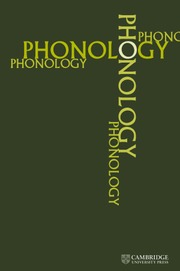Article contents
Indexation to stems and words
Published online by Cambridge University Press: 29 November 2018
Abstract
This paper presents an extension of indexed constraints, such that they can apply not only to individual morphemes, but also to potentially complex constituents such as the stem. This modification allows us to capture a class of long-distance morphologically derived environment effects (MDEEs) that have been previously unexplained. MDEEs typically involve an exceptional phonological pattern that is lost under affixation. Formally, MDEEs are predicted if complex constituents such as stems are treated as lexically exceptional only when every morpheme contained within them is independently exceptional. This approach further predicts asymmetries between bare roots and affixed words, between roots and affixes, and between inflected and derived words. All other things being equal, the first of each pair is more likely to be exceptional in more contexts.
- Type
- Articles
- Information
- Copyright
- Copyright © Cambridge University Press 2018
Footnotes
We would like to thank the editors and reviewers for their comments and suggestions. We would also like to thank John McCarthy, Bruce Morén-Duolljá, Marc van Oostendorp, Joe Pater, Curt Rice and Matthew Wolf for comments on earlier versions of this paper. We have benefited as well from comments and suggestions from Michael Becker, Ricardo Bermúdez-Otero, Daniel Currie Hall, Bruce Hayes, Joan Mascaró and Will Oxford. This paper was partly supported by the Connaught Young Researcher Award to Peter Jurgec.
References
REFERENCES
- 12
- Cited by


